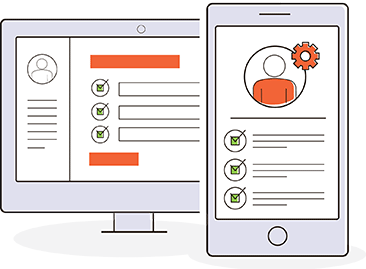A Guide to Business Rules Engine Software
By investing in rules engine software, organizations can improve productivity, transferability, and consistency.

If you’ve been in business for even a short time, you’ve likely figured out how quickly things can get out of control when you don’t put controls on your processes.
Business rules help you bring order to the workplace. That enables you to enforce consistency in your business, leading to better morale among workers and more satisfied customers. For that reason, many organizations use business rules engine software to guide how their organization functions.
What Are Business Rules?
Business rules outline the relationships between different business entities and help guide everyday decisions made within an organization. For example, a company might have a business rule that ties incoming orders to a specific team member. Think of business rules as individual blueprints of different essential activities within an enterprise.
By organizing a company’s processes into concrete rules, business users can use business logic to create automation processes that make the company more efficient. That cuts down on time-consuming manual processes and reduces inconsistencies caused by human errors. Implementing one business rule can increase the ability of companies to streamline work and cut down on employee churn.
When implemented correctly, business rules help organizations introduce consistency in business processes throughout the company. In addition, they provide enterprises with internal controls for conducting work. That way, they can stay in compliance with local, state, and federal regulations.
What Are Different Types of Business Rules?
Business rules typically fall into one of the following classifications. However, how you classify business rules can vary depending on the data source that fuels them.
Constraints
A constraint sets conditions that outline restrictions based on specific parameters. For example, you can define business rules that prevent users from accessing information from a particular data source without permission.
Derivation
A derivation business rule outlines specific parameters to look for to determine if a work item meets certain conditions. For example, you may create a business rule that evaluates whether a customer who places an online order through your website lives in a state that requires you to charge taxes. If so, you would apply additional rules that calculate appropriate taxes for the buyer’s state.
These rule groups form the basis for most rule engine software. It allows organizations to create automation that makes business decisions that speed up different processes. For example, many companies have business rules set up for functions like processing orders, setting up shipping, and initiating refunds.
You can also define a business rule more specifically as one of the following types:
- Coordination rule — A coordination rule sets up a general requirement that a process must meet to continue moving through a workflow. An example might be, “A request must include a department billing code.” Without that information, the rule keeps the item from moving forward.
- Qualification or disqualification rule — These rules determine whether a specific object or piece of information meets the defined parameters defined for a process. It filters out any items that don’t fit, so employees don’t waste time and effort on them.
- Decision rules — Decision rules evaluate a subject and determine its path. For example, a submitted request could get sent down a workflow for approval, rejection, or one that asks for additional information.
What is a Business Rules Engine (BRE)?
Rules engines can be used to evaluate conditions, execute actions and return results. They can also be used to trigger alerts or notifications. Business rules can also be used for data validation to ensure the accuracy and consistency of data. By automating these processes, businesses can save time, improve accuracy, reduce costs and compliance risks, and increase customer satisfaction. Furthermore, rules engines can integrate disparate systems and processes, allowing companies to leverage existing data and systems to make better, faster decisions.
How Do You Use a Rules Engine in an Enterprise?

Below are examples of how organizations within different industries use business rules to increase efficiency in business operations while cutting down on overhead.
Compliance
Companies that must adhere to specific guidelines set out by regulatory agencies, like those that work in healthcare or finance, can create compliance rules ensuring workers adhere to those policies. That way, they’re prepared when any regulatory body conducts a review to ensure they meet all requirements.
Approval processes
Many financial companies use business rules to review applications to determine if they meet their standards for approval. For example, an organization might apply a rule that automatically rejects applicants who don’t meet the minimum credit score standards.
Employee onboarding
Getting employees set up in their new roles can take a lot of time and effort. One example of improving efficiency is creating a business rule automatically assigning employees an email address or setting up their system credentials as part of an employee onboarding process.
Purchases and returns
Many retail businesses use rules software to set up workflows around customer purchases and returns. For example, a retail owner can set up a process to reject return claims if they fall outside a specific submission period. In addition, business rules can automatically apply discounts to members who sign up for customer loyalty programs once they hit specific purchasing thresholds.
What Are the Benefits of BRE Software?
By investing in rules engine software, organizations can reap benefits like:
- Improved productivity — By setting up business rules that apply to different applications and workflows, companies can reduce the time employees work through critical processes. In addition, organizations can make modifications to keep up with the changing needs of different business areas.
- Transferability — Business rules software makes it easier for companies to implement business rules throughout the organization. By documenting business rules within workflows, companies can more easily adapt them to use with other processes. That way, other teams can use those documents to modify the rules for different workstreams.
- More consistency — By implementing business rules, enterprises can ensure employees execute tasks consistently. In addition, it’s easier for companies to set up templates for working through different processes with automation. That helps reduce human error and helps companies remain compliant with industry regulations.
- Standardization — One of the benefits of using business rules is that they provide a consistent and standardized way of making decisions within an organization. By establishing clear guidelines for how certain processes should be carried out, businesses can ensure that their operations are efficient, accurate, and compliant with relevant laws and regulations.
- Error reduction — Business rules can help to minimize errors and reduce the risk of costly mistakes by providing a structured framework for decision-making.
Incorporate BRE Software Within Your Company
The Integrify platform gives organizations a centralized platform to create automated workflows driven by business rules.
We have a library of resources to help you on your journey to an automated workplace.


